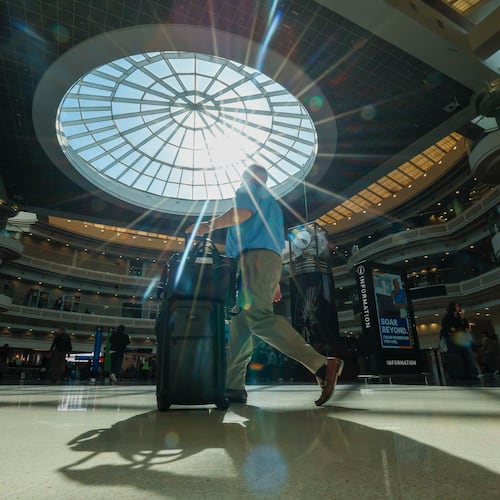Courtney Davis-Shoemaker was sitting with her laptop in Hartsfield-Jackson Atlanta International Airport’s Concourse F on a recent layover between Charleston, South Carolina and Marrakech, Morocco.
And she was frustrated.
“I really needed to get some of my work done,” she told The Atlanta Journal-Constitution. But instead, she spent a lot of the time fighting to get connected to the internet at the world’s busiest airport.
“I was trying to get a few of my bills paid,” she said. “I’m a clergy person, and I have a newsletter due to my congregation.”
She finally got access to a “Dining” Wi-Fi network, but couldn’t get her phone’s cellular data to work and couldn’t get on the airport’s free Wi-Fi network.
She wasn’t alone. Hopeful Delta Sky Club visitors in line were having trouble getting their Delta apps to load on the balcony above her.
Just a few hundred feet away, Tim Stone was one of the lucky ones who did manage to access the airport’s Wi-Fi network on his laptop as he waited for a flight to Los Angeles.
“Last time I was here I struggled, but this time it worked,” he said. He remembers the last time because his daughter wandered off into the concourse. “I thought I could call her, but I physically had to wander around to find her,” he recalled.
There are several reasons why it has been tough to get reliable cell service and Wi-Fi access at Concourse F and the international terminal.
And airport officials say they’re months away from a completed fix.
Wesley Almeida, the airport’s chief technology officer, told a panel at Avant South, a Georgia technology conference, that he was faced with the Concourse F service issue immediately when he took the job in February.
The problem, he said, is related to how the international terminal and Concourse F were built back in 2012.
Concourse F’s cellular network “architecture,” he said, is different from the rest of the airport.
Unlike other airports, Atlanta has a “neutral host” cellular architecture, meaning carriers like T-Mobile and Verizon rely on the airport’s own system to distribute their signal.
And in the international terminal, a decision was made years ago to distribute the carriers’ signal through “one piece of equipment between the rest of the airport and F,” Almeida told the AJC in a follow-up interview.
“It’s one piece and it aged out about five years ago,” he said.
That has left the airport struggling to find replacement parts on places like eBay.
It’s been an ongoing problem for at least three years, he said, and they see frequent complaints from the cellular carriers.
Credit: arvin.temkar@ajc.com
Credit: arvin.temkar@ajc.com
“Your cellphone will show full bars … but then you go to call and your call drops,” Almeida said. “That’s because it’s too much load (on the system).”
Meanwhile, as passengers struggle to use their cellphones, he said, they switch to Wi-Fi, which in turn can’t handle the demand.
“On average, we have 10,000 people on Wi-Fi at any given time,” he said of the airport, which does not restrict streaming or any activity.
And that Wi-Fi infrastructure is also aging and in the process of being upgraded, he said.
“So whenever you switch from one, it creates a huge load on the other. And then … the Wi-Fi is down, because everybody’s on it,” Almeida said.
The airport spent $350,000 this summer on a replacement of this cellular network architecture bottleneck with a “parallel system” with multiple connections to the other terminals.
“We were able to at least bring the system from a degraded state to a normally operating state,” he said.
While the experience still isn’t “great” for some users, there is a visible improvement in the performance data, he said.
Because there’s another issue with Concourse F: its high ceilings.
“The ceilings are ridiculously high, so the antennas are much further away than they should be from the users, which causes another problem,” Almeida said.
“When F is really, really busy, people’s bodies absorb the signal.”
The problem is likely to persist until 5G capability is installed in the airport, estimated to go live in March. It’s a $185 million project, he said.
The airport has already done its required hardware upgrades, and the carriers are installing their own equipment, he said.
“It will be a 10x improvement,” he said.
In the meantime, Davis-Shoemaker had to abandon her attempts to get service to catch her plane.
She hoped the flight to Morocco would have better Wi-Fi than the airport.
About the Author
Keep Reading
The Latest
Featured

